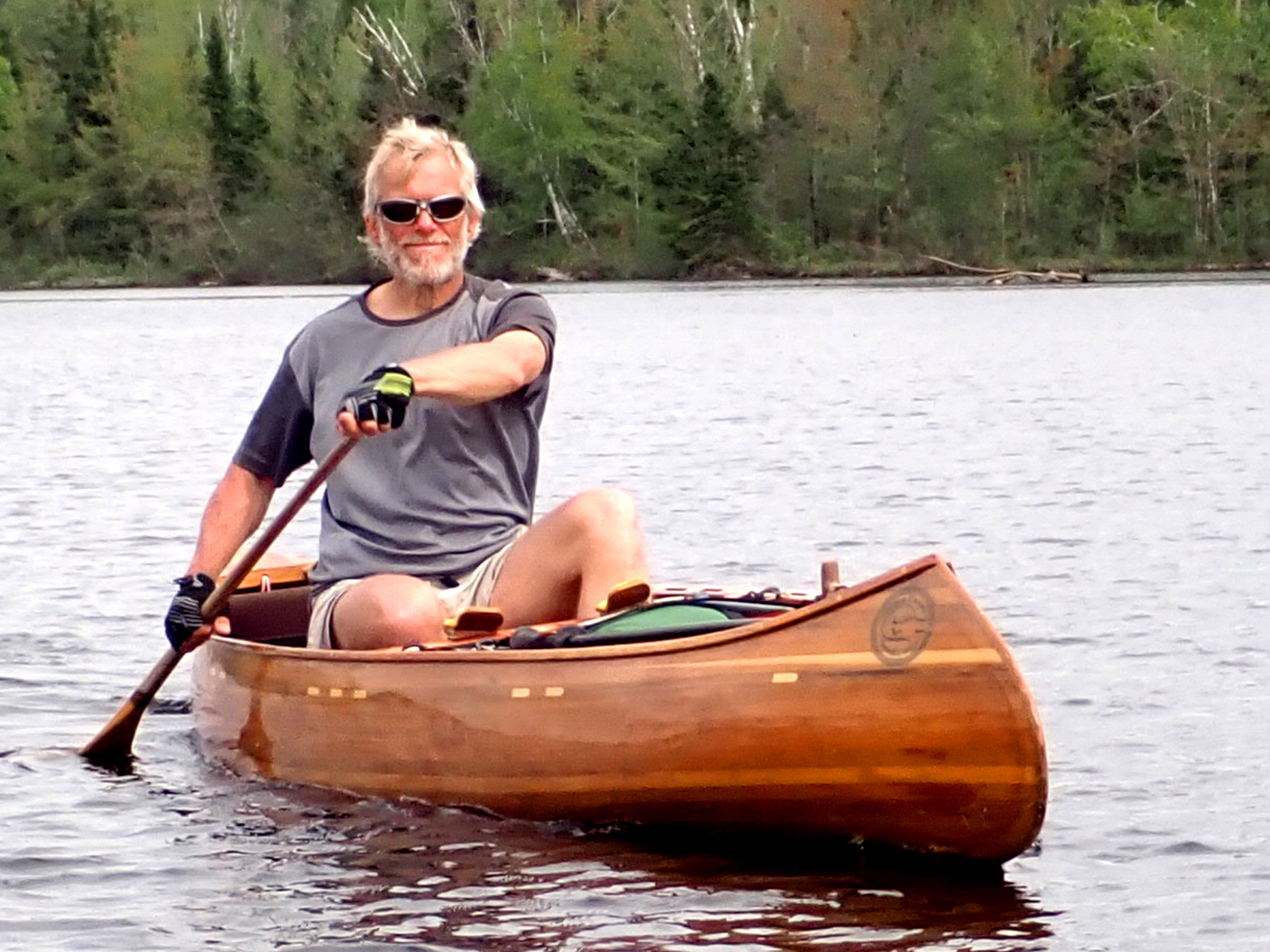|
Last night there was a hard frost. The under-quilt worked fine, but I'm not sure how much colder it would have coped with. Ice coated most things;
the water in my water bottle had frozen, and also in the cooking pot, put there in preparation for breakfast. And here was a first for me: my
toothpaste had frozen; it was hard to squeeze out enough for the morning ritual. In addition, the neoprene liners of my boots were rock-solid. I had
to heat extra water to pour into them to thaw them. Putting on cold wet socks was unpleasant, but then sliding my feet into pre-warmed boots was
almost pleasurable.
I was on the water soon after 5:30 am. Yesterday, my efficiency of travel had come on by leaps and bounds, effortlessly changing between paddle and
poles, a very slick operation, knowing exactly when to jump out and wade, the canoe sometimes not even stopping moving. Today, the fast flow over
shallow rocks frustrated me, and even the first deadwater was not all that “dead”. The routine of paddling, poling and wading continued
as the battle between patience and frustration waged in my head. All the time I remained intently focussed, moving up eddies, almost scraping the
bank, darting out into the current for a quick sprint around a fallen tree and back to the refuge along the bank. This was my experience of the
Allagash, and, frankly, it's not the best way to see such a beautiful river.
|
|
At the Musquacook Deadwater I finally found deep slack water which allowed me to use my long paddle again, but the wind took the edge off this
pleasure, blowing enthusiastically from the south once more, in my face. Strangely for a south wind, it was cold, very cold. For the first two hours
of travel today, drops of water on the gunwales from switching sides with the paddle quickly froze. For the first two days I had not worn my
paddling gloves; I have never liked the idea of them, preferring the intimate feel of the paddle. But my hands were beginning to chafe and split, so
I decided to try them today. They were better than I had feared, quite comfortable in fact, and helped to protect all but my fingertips (they are
fingerless gloves – I have yet to find fingered gloves with fingers wide enough not to be overly restrictive). They also provided some thermal
insulation, although my fingertips were cold in these conditions.
Somewhere on the long series of rapids approaching Round Pond, the first disaster occurred. I was regaining some of yesterday's efficiency of
switching between paddling, poling and wading, and making quite good progress. At one point I looked down to see my paddle sitting beside my pole
– singular. That was a déjà-vu moment. Five years ago on the Upper Ammonoosuc River I went to change from paddling to poling and
found that I had only one pole. On that occasion, I assumed that I must have missed with the pole-tip when putting them back in the bow. I paddled back
downstream and found it floating in an eddy. With that in mind, I had been paying close attention every single time that I switched from poles to
paddle here on the Allagash, ensuring that they were always safely stowed. I suspect vegetation may be to blame. The scrubby bushes on the bank all
point downstream, swept there by water and ice, no doubt. It is likely that, while I was wading, a springy branch grabbed a pole and flicked it out
of the canoe. With the lack of eddies to catch it, and considering how hard I had had to work to make progress up these rapids, I could not face
going downstream on what was likely to be a fruitless search. Short of finding a suitably sized beaver stick, my repertoire of available skills had
shrunk. I was also annoyed to have been guilty of littering, which I detest.
Round Pond gave me some brief respite from current, but all too brief. I looked wistfully at the camp-site where five years ago I had been treated
to some wonderful generosity by a couple of guys who were already camped there and happy to share. Interestingly, as my route took me to the
northwest out of Round Pond, the wind remained in my face; it must have been funnelling along the valley. At 4:30 pm I reached Long Lake dam for a
very short portage. Then, in Harvey Pond, I was once again able to slow my cadence and enjoy some deep water paddling.
It occurred to me that I had been paddling hard for much of the time, and my body was aching accordingly. Really, though, there was no alternative
– to take things easy going upstream is to make no progress. In Harvey Pond and then Long Lake, the wind, still southerly, increased to 15 mph
or more, putting a dampener on the final run-in to Jalbert camp-site. A sprinkle of rain also added some dampness. After a sunny start, the afternoon
had clouded up, and it was getting dark early.
I reached camp a little after 6:00 pm, over 12.5 hours after setting out. Because the wind was stirring up the lake water, mixing it with sediment,
I used previously filtered water, my precious supply, to cook macaroni, and then, rather than discarding the excess, used it to make hot chocolate.
It's better than you might think. My body was telling me that it needed some rest, so I was expecting to sleep well tonight. Tomorrow would be
shorter in miles, but would include the class II Chase Rapids for nearly five miles leading to Churchill Dam and the top of the Allagash, another
milestone. Today's wildlife included osprey, Canadian jays and many mergansers.
|


